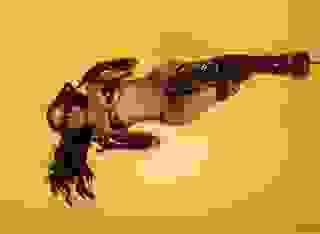Note: You can change font size, font face, and turn on dark mode by clicking the "A" icon tab in the Story Info Box.
You can temporarily switch back to a Classic Literotica® experience during our ongoing public Beta testing. Please consider leaving feedback on issues you experience or suggest improvements.
Click hereWith my one nonslick hand I manage to work my pajama bottoms down. Her hand reaches back.
My secret is out. At least being old means you get to know lots of doctors doing lots of clinical trials.
"You took that pill," she says.
I don't reply. It is a rhetorical question. I bend my knees and line up my cock. God, it feels good to be this hard again.
I push in slowly. She breaths heavily, panting onto the cold window, the mist slowly obscuring the two old people reflected there until the marks of age are blurred and we see only faces of the young.
**********
22 May 1945
London
I was... what? 27, 28? I could not do the math at the moment. I had been an Army cadet. I had been an Army officer. I had been a boat builder, a carpenter, a sailor, a wild blueberry picker, a potato sorter. I had shot men and tossed their bodies into the English Channel. I had been a spymaster, a spy, an infiltrator.
All those things and I had never learned to drink the hard stuff. Beer and wine for me, please. Any form of ethanol more concentrated than those just burned my passages.
And yet here I was, in the shadowy back booths of the King's Own Hart with a bottle of something called White Horse in front of me and a glass to the side. Glass? Fuck it, I was drinking from the bottle. It was supposedly a cheap whisky, but it worked the same as the expensive stuff. It tasted like varnish smelled - with an old apple thrown in. Not that I had any taste left.
The day after V-E day I drove the Hillman to London and parked it illegally. Left the keys in it. I took a room at the Langham, walked across the street to this pub, and began to systematically sample every bottle of gin, vodka, whisky, and rum they had in stock. I settled on the Horse and initiated my plan to get and stay stinking pissing hurling drunk until.... Until when? I had no clue.
Maybe until the crowds on the streets and in the parks stopped celebrating. Every goddamn cheer and song was like nails on chalkboard.
Maybe until I forget my name and then my recent past and then the whole rest of my damn life.
I am like the Hillman, wherever it is now. I am parked without a care, keys in me, waiting for the next driver.
The problem was -- and I did not know this, not being much of a drinker up until two weeks ago -- that drunk you remember more, not less. And losing consciousness just delayed the next round of memories.
Every day I had contemplated buying a book to read, something to distract me from my own damn thoughts, until I became incapable of walking. Every day I paid one of the barmen to assist me back to the hotel at last call and just never got around to getting to a bookstore.
There were plenty of newspapers in the pub, but I would not read news.
I was looking up at a print of a dyspeptic Henry the Eighth and a figure came into my field of vision. I waved it away, as my bottle still had several fingers left in it. The figure did not go away. It sat in the bench opposite.
"Hello, David," Boyce said. He motioned to the barman, who brought him an empty glass. Boyce poured from my bottle and sipped.
"Interesting. Can't remember the last time I tasted this one."
I kept my head turned away. Boyce reminded me of the camp, and the camp reminded me of.... I kept my head turned.
I reached for the bottle, but Boyce had a firm grip and would not relinquish it.
"Let's have a stroll," he said.
I went to shake my head. It was about the last thing I wanted to do.
But Boyce, who still looked like a disheveled solicitor, always got what he wanted.
We walked down the street to the park. He walked. I kind of leaned on him as he did so.
Luckily the enthusiasm of victory was proving transient. The park was quiet. Probably everyone was now worried about the war with Japan.
Boyce talked the whole time. About the weather, about the great footer match between England and France he had attended in 1933, about the new Zippo lighter he had purchased, about his wife's obsession with tea roses, about fertilizers for said roses, about--
I realized I was sober, or close enough. I stopped walking.
"What do you want?"
He turned to me. "What should I expect?"
"Still breathing," I shrugged. He could not have known of the times in the last fortnight I had regarded my Colt with some odd feeling akin to longing. Wondering if numbness in a featureless unknown would be better than the memories that came relentlessly around and around like Dorsey on a gramophone.
We watched a duck mother leading five freshly feathered offspring to the water.
"Fancy a position?"
He was referring to the not very much a secret in the intelligence community that he was moving to MI6, high up in the building.
"No, thanks. I should like to never have to kill another person if I can avoid it."
He nodded the way my father used to nod, with patience. "The offer will stay open. Come see me if you change your mind."
He removed a small white envelope from his pocket and passed it to me.
"This came for you. Through channels that tell me it is authentic."
On the outside was written in a florid feminine hand: David.
**********
23 May 1945
London
The address was in Bromley, an apartment over a tobacco shop. I walked up and tapped on the door.
My heart was a trip hammer. I felt faint.
She opened the door and smiled with a mixture of delight and trepidation.
"Hello, David," she said. Then her eyes found the card I was gripping.
"I am sorry. I suspected it would be the only sure way to lead you here."
Inside the card was written the address. Below that, one word.
Clafoutis.
It was an infinitely-sheer slice, but it was. And now it was not.
I knew it could not be.
I stood deflated, emptied for what felt like surely the last time. Please God, the last time?
Her face fell. She did not apologize.
Chodakowska took my elbow and led me inside. I collapsed onto a divan.
She pulled up a chair and sat close. Leaned forward.
We sat and breathed for a while. My respiration slowly calmed.
"My name is Elzbieta."
I nodded dumbly.
"I needed to see you.... I needed for you to see--"
On cue, a boy entered the room. He was dragging a toy truck by a long string. He looked at me, his young face guileless and curious, then spoke rapidly in Polish to Elzbieta. He had her lips, but his eyes and nose and ears, even the shape of his head--
I ripped my gaze away from him and stared at Elzbieta. She had moisture brimming in her eyes but would not meet mine.
"David, I was a virgin... that day."
I realized my mouth was hanging open.
"I lived, but I was... what is the word?" She waved two hands, her fingers waggling. "Shredded? Yes, shredded - inside. After I recovered, I was afraid of men. I hated men."
I nodded my understanding.
"When I met you, I... I knew that you would never hurt me. I was attracted to you in a way I had not been attracted to a man before. I made love to you that day, telling you it was a test. It was not a test. I just wanted you to be my... first? Is that a stupid thing to say after...?"
"No. Absolutely not."
She seemed greatly appreciative of my response. She wiped her eyes.
When she started missing her period, she thought nothing of it. The damage had caused her to become quite irregular, and it was three months before she consulted a doctor and got confirmation.
"I wanted to tell you, but I didn't want to distract you. What could you have done anyway? No, I kept it to myself. Besides, the doctor told me the chances were not good that I could even carry the baby all the way. My womb had healed somehow, but it was weak. The scars...."
Her womanly organs managed to stay in one piece until the birth. As her water broke, the contractions tore apart the tenuous connections inside her. The scars opened. The baby came out healthy, but Elzbieta needed extensive surgeries to save her life.
One miracle baby. There would be no more.
She named him Dawid. Dawid Voight. She fetched the birth certificate and proudly showed me.
My battered brain wondered if you got a Jr. Or if all the names had to match. Or if there were even rules for that kind of thing.
Dawid came over to us and he pointed to his truck.
"Ford," he said solemnly.
Elzbieta smiled down at him. "I wanted him to meet you before you--" Her voice caught. "Before you return to America."
I looked at the kid's serious little face. The eyes that matched the ones I had seen in photographs of me as a child. The nose and ears, even the shape of his head.
My world pivoted again. Just got lifted right up and set down ninety degrees from what had been north moments before.
I stood and lifted the mother of my child to her feet.
I embraced her. Hard and long. I did not have to tell her that I would never leave her. I did not have to tell her that I loved her and I loved our son. All those things were conveyed in the embrace.
Later I would put them into words. Into action.
I felt pressure and looked down. My son had his own idea of a hug. His arms were wrapped around his mother's legs. His hands reached just far enough beyond them to grab also onto my calves.
**********
13 February 1996
London
The west cloister of Westminster Abbey is a long quiet narrow space of stone floor, stone columns, and stone arches, built to give monks a place to sit and copy manuscripts or read Scripture in natural light. They would talk there, pace and contemplate, or just take a break from the whatever were the stresses of a monk's life. In ones and twos and threes. It was not designed to host meetings.
It definitely was not designed to comfortably accommodate the hundred or so folding chairs arranged today in tight rows facing the inner wall where a large blue cloth covers a part of the stone.
The chairs had slowly filled as the start time approached, so I dispatched the grandchildren to watch from the wings and free seats for their elders.
The Voight family is here in force. Myself and Els and Dawid and his wife. Their three boys and one daughter, all with their spouses. Six teens, four toddlers, and one baby bump between them.
They had all arranged time to come after I made it clear to them it was important to me and Els. I have a family dinner planned tonight in a private room, and after the meal the smaller children will go off with a nanny. My wife and I will then tell them the story of our lives. Some of them know some of the events, but tonight it will be time to put an end to all secrets.
The politicians finish their remarks and the Queen Mother shuffles to the wall.
The crowd is quiet. I don't recognize any faces, which as a former intelligence agent makes me happy but as an old man makes me melancholy.
Her Majesty pulls a cord and the sheet drops. Underneath is a simple marble plaque, of a modest size befitting an organization which always endeavored to shy from notice. It reads:
--------------------------------------------
SPECIAL OPERATIONS EXECUTIVE
In memory of the members of all nationalities of S.O.E. who sustained the spirit of resistance and gave their lives for the liberation of the occupied countries.
1940-1945
--------------------------------------------
There are 3000 and more notables buried in the Abbey, in crypts, in tombs, under the floor.
There are no bodies to be laid under this stone. They are lost in France, or Germany, or in the ocean waters.
Maurice Plowman and John Trevor of the Maelstrom network.
James Griffiths-White.
Lady Anne Jennings.
Moira Haining.
Some time later, the kids are dispatched to the hotel in taxis. The news media fled in their vans to more contemporary news. The cloister is quiet and cold. Only the ghosts remain to keep us company.
Elzbieta and I stand in front of the memorial, holding hands.
"It was so...." she says quietly, reaching out with her free hand to touch the carved words. "We were so young."
"We did what needed to be done," I reply softly. The ghosts must keep resting. "The best way we knew how."
"If we had it all to do again?" She whispers.
Our hands tighten together.
- COMMENTS
IMHO, if you are not writing professionally, you may well be in the wrong job! Brilliant.
Written so clearly, the complexity unfolding gently, with characters in depth, and in such a genuine way that made this short story as much a tribute as it was a love tale. Congratulations, and I shall look through the remainder of your collection with anticipation.
That she betrayed him and the agents for a worthless man such as James is heartbreaking. She had enough training to know that what she did was treasonous.
A story out of time. Awe-full. Wonderful read. Gripping. Draws you in and forward.
Had to read it again. Then again, more carefully, making sure I understood who was speaking, who was living, who was dying, all the while hearing (in my mind) Mary Hopkin singing "Those Were the Days" and wishing this story were much longer.








